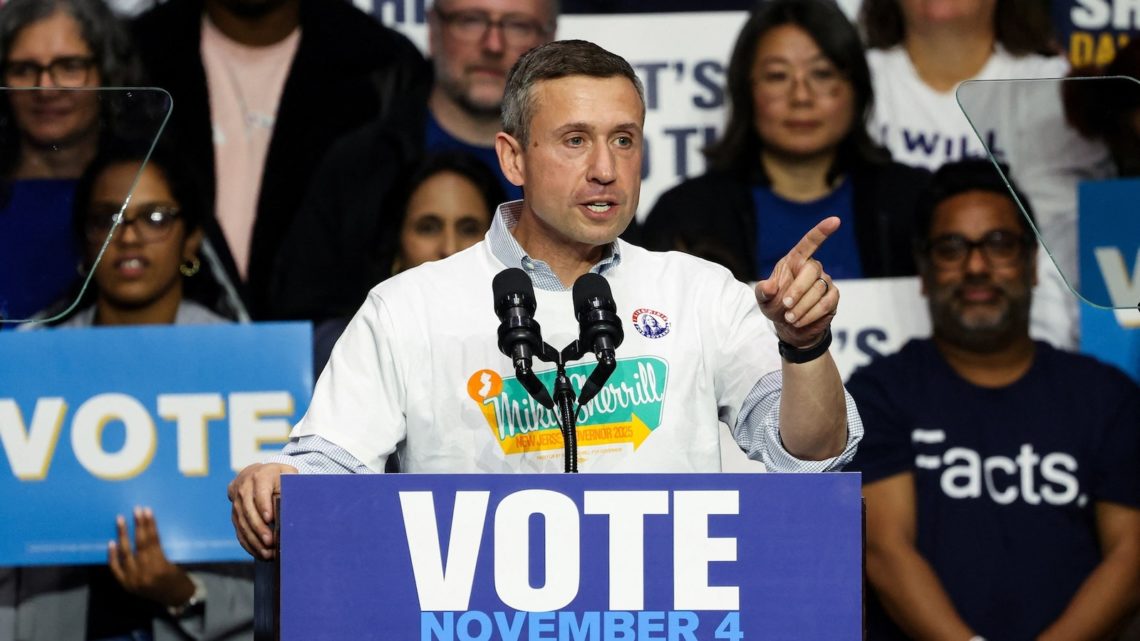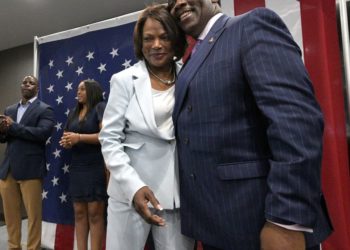Democrats, in the throes of rebuilding their party can agree, at least, on one thing: they are fed up with being portrayed as losers.
Several ABC News interviews with Democratic strategists, current and former national staffers, and state-level officials raise several questions from within the party of how to best shift perceptions ahead of the midterms: does the party go full bore on anti-Trump messaging as the navigate the politics of the ongoing government shutdown and voters feel the pinch? Do they focus, instead, on boosting progressive rising stars even as Republicans paint the party as too-radical?
Some less conventional Democrats question whether the party should bother relying on the traditional leadership structure, who may lean too much on outdated tactics, in Washington at all. While other, more traditional members, argue they’re not in as much disarray as their critics claim.
Democrats in Washington point to recent wins as proof that their brand is not as toxic as some critics claim: two Republican legislative district flips in Iowa; electing a Democrat in a Pennsylvania state senate seat for the first time in 130 years; elevating a Democratic mayor to lead Omaha’s blue dot, for example.
They’re banking on likely successes in the days-away gubernatorial races in Virginia and New Jersey (and to a lesser extent, dominance in New York City’s mayoral race) as reputational defibrillators a year out from the midterms.
“We have the momentum, certainly, heading into this final stretch,” Democratic National Committee chairman Ken Martin told ABC News in a recent interview, of anticipated wins in New Jersey, Virginia, and Pennsylvania’s supreme court races.
Yet a recent ABC News/Washington Post/Ipsos poll found that more Americans say the Democratic Party is “out of touch with the concerns of most people in the United States today” (68%) than Trump (63%) and the Republican Party (61%).
Asked on Sunday why more Americans feel this way about Democrats than the president — even amidst the East Wing demolitions or a White House Halloween party hosted during the shutdown — Martin suggested Republicans were in hotter water and disapproved of by Americans more.
But pressed on what Democrats are doing to try to get more in touch with voters — or why he thinks, even if there is a swing away from Trump, people still see the Democrats as out of touch — Martin said he’s confident the party is making strides regardless of what the polls say.
“I can’t speak to that because I’ve seen a lot of other polls that suggest just the opposite, right? People are starting to put their trust and faith back in with the Democratic Party. And you know, I can tell you right now that you know, we’ve been out there having conversations with voters, growing our coalition,” Martin said, adding that Trump’s policies and actions are creating an opening for Democrats to have conversations with disillusioned voters.
Democrats also hope to mine several lessons from their soon-to-be-released election analysis (don’t call it a postmortem, members joke).
One of Martin biggest takeaways from the report, he told ABC News, is that “everyone just started their campaign way too late, and we had already been defined before we ever had a chance to define ourselves … we cannot wait to talk to voters until the final few months before an election.”
Yet, some Democrats see their party’s lower approval numbers (32%, per a recent Associated Press survey) and believe they should pivot away from the traditional party apparatus.
“We are a party without a leader, and so there is no one to set the tone,” a former DNC staffer and Democratic strategist told ABC News.
They argue that there are vulnerabilities beyond the DNC, but also from more classical candidate recruitment from congressional leadership’s political operation, who they suggested are not taking necessary risks on non-traditional picks. Sen. Chuck Schumer is reportedly facing resistance to his leadership among potential Senate candidates.
A second former DNC staffer, who has since worked on presidential campaigns, put it more bluntly: “The current iteration of the DNC has weakened itself out of relevance and should not be seen as anything but a fundraising vessel.”
Libby Schneider, deputy executive director of the DNC, concedes that it’s typical after an election loss to be heartbroken and upset, and understands there may be some criticism in its wake. Despite that, she argues the committee is laser-focused on winning and wishes to be a tool to help candidates succeed.
“People can feel what they need to feel and grieve how they need to grieve about this loss, and we will change the things that we need to change in order to continue to perform well. But to me, people complaining tells me that they care a whole lot, and I think that that’s valuable. And also, frankly, we can listen to that stuff and still do our jobs every day to elect Democrats,” said Schneider.
“We went from being the party of cool with Barack Obama to turning into the party of nerds and dweebs and losers, right? What is really annoying about all of it is that we have winners. We have good stars,” the second staffer continued. told ABC News.
Obama has aligned himself, and whatever residual it-factor he possesses, with marquee political fights over the last few months: rallying Texas Democrats who broke quorum, in-person campaigning for both the Virginia and New Jersey gubernatorial races, boosting Democrats in Pennsylvania’s supreme court elections, to cutting ads for Gov. Gavin Newsom’s redistricting proposition.
Former Vice President Kamala Harris is also keeping her options open on her political career, as she publicly doesn’t rule out another White House run during her book tour.
There’s no consensus that Harris is the exciting nominee she once was — though the first former DNC staffer suggests.
“She shouldn’t be sent out to pasture — she made the most out of an impossible situation for four years. At the same time, if we’re serious about telling voters we’re moving forward — she can’t be our nominee in 2028. Is she a leading voice in the party, yes? Should she be our main and only voice, absolutely not,” the first former DNC staffer added.
Vermont Sen. Bernie Sanders has also been criss-crossing the country with rumored ’28 candidate Rep. Alexandria Ocasio-Cortez drawing substantial crowds, meanwhile, former Chicago Mayor Rahm Emanuel and Newsom have not shied away from their ambitions, either.
Some Democrats argue that not having one main spokesperson presents an opportunity for the various stars, rising or seasoned, to sparkle.
“We have to be a tent that wins by addition and not subtraction,” Schneider said. She feels confident ahead of Tuesday’s elections, and believes that there’s a strong case to be made to voters about Trump’s impact on their bottom line, their health care premiums, their overall cost of living, as well as voters’ souring on the president’s handling of the economy and immigration.
Per a new ABC News/Washington Post/Ipsos poll, roughly 6 in 10 Americans disapprove of Trump’s handling of the job.
And despite worries of disinterested donors and shrinking voter registration, the campaign arms of the party, taking cues from Senate Minority Leader Chuck Schumer and House Minority Leader Hakeem Jeffries, are outraising their Republican counterparts, even as the national party heavily lags in that arena. The DSCC raised nearly $20 million in Q3, versus the NRSC’s $18 million, and the DCCC currently has a slight cash-on-hand edge, with $46.6 million to the NRCC’s $45.8. A DNC official says the committee
Former Virginia Gov. Terry McAuliffe, who rebuilt the DNC as chair after the party’s devastating losses in 2001, is bullish on his party’s chances to sweep over the next year, as he believes droves of voters will reject Trump due to rising costs, shrinking access to health care, and negative impacts of the government shutdown, and trickle back to Democrats after this off-cycle election day.
“The Democratic Party is poised to take off like a booster rocket,” said McAuliffe, who, a few weeks ago, hosted a packed fundraiser for Virginia’s Democratic gubernatorial candidate, Abigail Spanberger, at his home alongside the Clintons on behalf of the Democratic Governors’ Association.
McAuliffe said the 400-or-so attendees raised $2.2 million in one night — proof, he argues, of his party’s unquestionable desire to win. His message to hand-wringers and eye-rollers, even some within the party, echoes from what many at the top tell ABC: “We need to be encouraged, people are counting on us to fight. I’m tired of the whining, complaining, the party of lemon suckers. Get in the game.”
Jaime Harrison, Martin’s most recent predecessor at the DNC, realized the extent of his party’s vulnerabilities during his 2020 Senate bid to unseat Republican Sen. Lindsey Graham. (Santa Claus could run on Christmas as a Democrat and lose, he jokes.)
Harrison worries about the perceptions of disjointedness, and suggested that various groups like the DGA, members of Congress, and the DNC convene for a joint-policy retreat “so that people see we’re all in alignment on our message, on our mission.”
Harrison also said he hopes the party seriously considers hosting a midterm convention, which could amplify their talent and hammer home their priorities. Schneider said a potential event is “in the mix.”
“The Democrats are looking for a unity of purpose, a unity of message, a unity of strategy. And it’s important that the leadership right now provides that,” said Harrison, who says he trusts Martin and believes support, from donors and otherwise, will return after Democratic wins on Tuesday.
“I’m not overly concerned. If we were in June of ’26 and we’re still not getting major donors, then I’m concerned. But we’re not there yet,” he added, expressing confidence in the continued grassroots support.
Some Democrats also point to Martin’s tenure as one that prioritizes infrastructure. For example, state parties now get major influxes of cash, to the tune of a million dollars a month, to hire staff, set up programs, and fortify their ranks. “Party changing money,” adds Schneider. Lauren Nechochea, chair of the Idaho Democrats, told ABC News her chapter now has steady, monthly financial support.
Texas Rep. Gene Wu, chair of the Lone Star State House Democratic caucus, said Jefferies and Martin gave his cohort full support to break quorum and attempt to block Republican redistricting efforts, a move that kicked off the party’s more aggressive opposition to redistricting nationwide.
Wu acknowledges that the perception of the Democratic Party is in peril, and is anxious for politicians to openly fight for the working class. He says voters, friends see Democrats as message-less, scolding hall monitors.
“People who would rather be right than win; people who would rather spend the time to tell other people how they’re wrong instead of telling people what they would do about it and how they’re going to fix it,” Wu told ABC News.
Wu said candidates need to be firmer on their beliefs, and his party must run candidates willing to take Republicans to task (like California’s Gov. Newsom in his push to draw Democratic friendly maps) or face total failure.
“I think that the reality of where we are today and what the cost of failure will mean, I don’t think people are under any illusion of where we are at this moment,” said Wu, who added, “this is not time for us to screw around … I don’t give a crap that you think Democrats are wimpy or whatever else. But if you want America to not suck anymore, you better join us.”
The post Democrats lean into fighter persona as party rebuilds ahead of 2026 midterms appeared first on ABC News.




